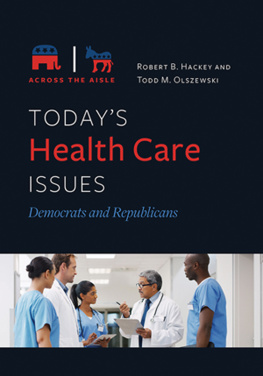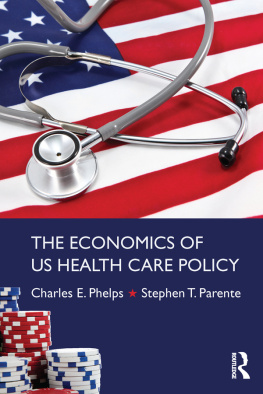Todays Health
Care Issues
Recent Titles in the Across the Aisle Series
Todays Social Issues: Democrats and Republicans
Timothy W. Kneeland
Todays Economic Issues: Democrats and Republicans
Nancy S. Lind, Erik T. Rankin, and Gardenia Harris
Todays Foreign Policy Issues: Democrats and Republicans
Trevor Rubenzer
Todays Environmental Issues: Democrats and Republicans
Teri J. Walker
Todays Health
Care Issues
Democrats and Republicans
ROBERT B. HACKEY AND TODD M. OLSZEWSKI
Across the Aisle

Copyright 2021 by ABC-CLIO, LLC
All rights reserved. No part of this publication may be reproduced, stored in a retrieval system, or transmitted, in any form or by any means, electronic, mechanical, photocopying, recording, or otherwise, except for the inclusion of brief quotations in a review, without prior permission in writing from the publisher.
Library of Congress Cataloging-in-Publication Data
Names: Hackey, Robert B., author. | Olszewski, Todd M., author.
Title: Todays health care issues : Democrats and Republicans / Robert B. Hackey and Todd M. Olszewski.
Description: Santa Barbara, California : ABC-CLIO, [2021] | Series: Across the aisle | Includes bibliographical references and index.
Identifiers: LCCN 2021000781 (print) | LCCN 2021000782 (ebook) | ISBN 9781440869150 (hardcover) | ISBN 9781440869167 (ebook)
Subjects: LCSH: Medical careUnited States. | Medical policyUnited States. | Health services administrationUnited States. | HealthGovernment policyUnited States. | COVID-19 (Disease)Political aspectsUnited States.
Classification: LCC RA395.A3 H3314 2021 (print) | LCC RA395.A3 (ebook) | DDC 362.10973dc23
LC record available at https://lccn.loc.gov/2021000781
LC ebook record available at https://lccn.loc.gov/2021000782
ISBN: 978-1-4408-6915-0 (print)
978-1-4408-6916-7 (ebook)
252423222112345
This book is also available as an eBook.
ABC-CLIO
An Imprint of ABC-CLIO, LLC
ABC-CLIO, LLC
147 Castilian Drive
Santa Barbara, California 93117
www.abc-clio.com
This book is printed on acid-free paper 
Manufactured in the United States of America
Contents
Health policy in the United States is at a crossroads. Will policy makers and the public embrace a larger role for government to address the challenges facing the U.S. health care system? Or will key decisions remain in the hands of providers and other private-sector actors? The 2020 presidential election offered Americans a stark choice about the future direction of U.S. health policy, as health policy issues emerged as a key litmus test for both Democrats and Republicans. During the preceding decade, divisions in both American society and its politics have widened and hardened (Seib 2019). These divisions are particularly evident in heated debates over abortion, contraception coverage, the individual health insurance mandate, and Medicaid expansion, among others. The parties positions on these contested issues, in turn, reflected deep-seated and strongly held beliefs about the proper role of government in American society. While Democrats championed a greater role for government in solving social problems, Republicans prescribed private, market-based policy reforms.
Health policy is not a new battlefield for partisan politics. Democrats and Republicans sparred over national health insurance for most of the 20th century. Current policy debates often evoke a sense of nostalgia: Democrats talk about public policy as though it were always 1965 and the model of the Great Society welfare state will answer our every concern. And Republicans talk as though it were always 1981 and a repetition of the Reagan Revolution is the cure for what ails us. It is hardly surprising that the public finds the resulting political debates frustrating (Levin 2017, 15).
President Barack Obama won a historic victory with the passage of the Affordable Care Act (ACA) in 2010, but it came at a high political price. Democrats enacted Obamacare without a single Republican vote; ongoing Republican opposition to the ACA led to midterm debacles for Democrats in 2010 and 2014. After regaining control over both houses of Congress in 2014, Republicans worked tirelessly to repeal, replace, or restrict the scope of the ACA. Republican proposals to overturn the ACA sputtered out in 2017, but Republican governors and attorneys general mounted new legal challenges. As James Morone (2014) observed, There has not been this much conflict over a Congressional act since prohibition. Democrats and Republicans remain locked in a policy stalemate at the federal level. The ACA survived despite repeated attempts to repeal and replace it by Republicans in Congress (and later by the Trump administration). Nevertheless, Republicans succeeded in weakening the law in 2017 by eliminating penalties for individuals who did not purchase health insurance.
Abortion remains a fiercely contested partisan issue nearly five decades after the U.S. Supreme Courts landmark decision in Roe v. Wade. The two parties have offered voters diametrically opposing views on this hot-button issue. Donald Trump became the first sitting U.S. president to formally address pro-life supporters when he gave remarks at the annual March for Life in January 2020. All the candidates who sought the 2020 Democratic presidential nomination opposed restrictions on abortion, indicating how pro-life Democrats are now an endangered species (Bailey 2020). Meanwhile, all Republicans in the 2020 House of Representatives held pro-life views, as did all but two Republican senatorsthus making pro-choice Republicans an endangered species on the GOP side (Peterson 2019).
Democrats and Republicans continued to wrestle over health policy in a hotly contested electoral environment. Since 2000, both parties have grappled with unstable electoral majorities. Party control of the House, Senate, or White House changed in seven of the nine elections between 2000 and 2016 (Taranto 2018). This trend continued in the 2018 midterm elections when Democrats regained control over the House of Representatives for the first time since 2010. Such intense party competition left control over Congress up for grabs in nearly every election cycle. Under these circumstances, members of the minority party have little incentive to compromise, for victory in the next election could bring a switch in party control and a new governing majority. Consequently, the American political environment has become a landscape infused with partisanship, polarization, and mutual intolerance. Simmering tensions over politics, economics, and culture have metastasized into an overarching us-versus-them environment (West 2019, 3).
In such a sharply polarized political environment, the courts emerged as the final arbiter of many controversial health policy questions. In a series of cases beginning in 2012, the U.S. Supreme Court became a pivotal health policy battleground. While the ACA survived two challenges by narrow 54 majorities in the cases of NFIB v. Sebelius (2012) and King v. Burwell (2015), the Roberts Court upheld limits on the ACAs contraception mandate in Burwell v. Hobby Lobby Stores (2014).
The Trump administration recognized the significance of the courts as policy makers immediately after taking the reins of the federal government in January 2017 and quickly joined forces with Senate Republicans in an effort to remake the federal judiciary. By the end of his term in office, Donald Trump had nominatedand the Senate confirmedmore than 220 conservative appointees to the federal bench. The confirmation process became a partisan battleground; most judges (77 percent) nominated by President Trump faced a cloture vote in the U.S. Senate, and nearly half (45 percent) were confirmed over the opposition of 25 percent or more senators (Heritage Foundation 2020). However, the Trump administrations success in shepherding nominees through the confirmation process shifted the partisan balance on federal appellate courts and cemented a 63 majority on the U.S. Supreme Court with the appointments of Justices Amy Coney Barrett, Neil Gorsuch, and Brett Kavanaugh. By February 2020, Republican presidents had appointed more than half (54 percent) of all active federal appellate judges (Wheeler 2020).









